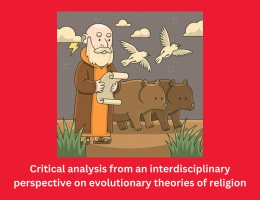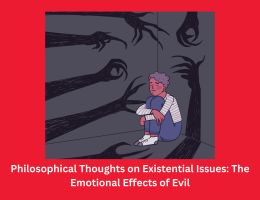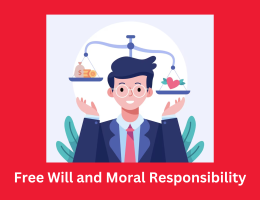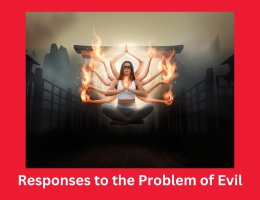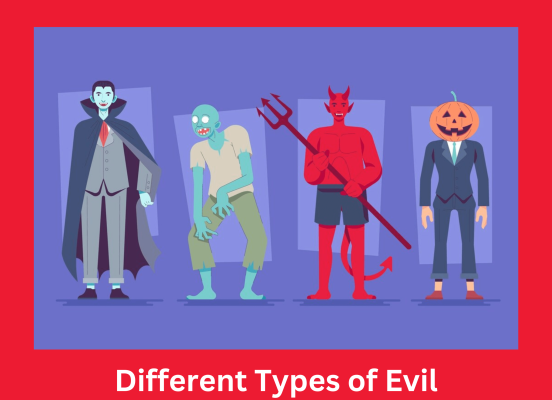
Different Types of Evil
- By admin --
- Friday, 08 Mar, 2024
The time period "different forms of evil" refers to a huge variety of human reviews, from moral evil—which ends from humans's decisions and movements—to natural evil, which takes the shape of distress introduced on by ailments or natural screw ups. To cope with the giant troubles these classes of evil increase regarding the character of lifestyles, morality, and the hassle of evil, one need to have a thorough expertise of them.
Moral evil, frequently called human-triggered evil, is the umbrella term for deeds and attitudes that reason injustice, pain, or harm to other people. This category covers a huge range of moves, from small-time thievery to genocide, from deception and mendacity to violent and terrible deeds. Human unfastened will, or the capacity to make movements that affect both oneself and different humans, gives upward thrust to moral evil. People may additionally decide to act in a manner this is morally repugnant for a variety of motives, such as lack of empathy and ethical recognition, hatred, greed, or selfishness.
The presence of ethical evil severely undermines conventional theological and philosophical ideas of a loving god. Why does God, who's all-understanding and all-powerful, allow humans to carry out cruel and unfair acts? Why doesn't he step as much as forestall human wrongdoing from causing struggling? These issues cast extreme doubt on the opportunity of a deity who's both omnipotent and ethically perfect and who can tolerate ethical wrong.
On the other hand, misery and adversity delivered on by way of uncontrollable herbal phenomena are referred to as herbal evil. Events like hurricanes, floods, droughts, famines, earthquakes, and ailments fall under this class. Natural disasters frequently have an effect on massive populations and motive enormous misery further to producing big destruction and fatalities. Similar to how sicknesses and epidemics can cause extremely good bodily and mental suffering to humans and communities, they can also bring about contamination, disability, and even loss of life.
Hard troubles regarding the nature of divine windfall and the problem of struggling are brought up by the life of natural evil. Why would a loving, all-powerful God permit innocent beings to go through because of herbal occurrences? Why would not he forestall diseases and herbal failures from occurring, or at the least reduce their bad results on humans's lives? These doubts increase doubt at the lifestyles of a kind deity who would permit such suffering to show up, challenging universal ideas of divine windfall and kindness.
Natural evil and ethical evil have a nuanced and complex relationship. Natural evil appears to be innate within the natural universe itself, whereas ethical evil results from choices and deeds made thru human beings. But the results of every styles of evil regularly converge, causing a first rate deal of distress and adversity for each people and society.For example, pastimes such as human sporting activities weather fluctuations, environmental pollution and others can increase the frequency and depth of herbicide risk, leading to loss of livelihood and destructive at best.
Moreover, considering that suffering regularly combines herbal forces with human corporation, the difference among ethical evil and herbal evil is often not smooth. For example, human behaviors like excursion and exchange, in addition to environmental factors like population density, get right of entry to to healthcare, and sanitation necessities, can also additionally additionally all have an effect at the spread of infectious illnesses. Similar to this, human reasons like urbanization, deforestation, and poor infrastructure might also furthermore furthermore make the consequences of herbal catastrophes worse.
Notwithstanding those issues, comprehending the numerous origins and expressions of human struggling requires an focus of the severa types of evil. The traditional non secular and philosophical reasons of divine windfall and the trouble of evil are challenged otherwise with the aid of moral evil and herbal evil. Overcoming the ones limitations necessitates a sophisticated comprehension of the intricacies of human existence and the complicated interactions amongst human organization and herbal forces.
Theologians and philosophers have recommend a number of justifications and motives for the lifestyles of evil. There are folks who contend that the existence of moral evil is a prerequisite for ethical agency and the functionality for actual ethical obligation. This point of view holds that ethical character improvement and virtue cultivation depend on an man or woman's capacity to make moral alternatives. Others have put forth the idea of soul-making, or theodicy, which holds that struggling has a greater purpose in God's plan and aids in humans's ethical and non secular improvement similarly to the arena's redemption.
Similarly, the idea of a fallen or flawed global—in which natural activities are at risk of decay, corruption, and ailment—is regularly invoked in defense of natural evil. This factor of view holds that the lifestyles of herbal evil isn't always a reflection of divine malevolence or indifference, however rather a result of the restrictions inherent inside the created order. Others have highlighted how human duty performs a component in lessening the consequences of ailments and herbal catastrophes via enforcing strategies consisting of environmental stewardship, public health campaigns, and catastrophe preparedness.
Even with all of those attempts to deal with the difficulty, evil continues to be a profound riddle that confounds both believers and skeptics. Very painful problems run through the life of a bad moral herb, such as man with a divine purpose, the reality of human suffering, the limits of human reason, etc. The contemplation of these problems requires humility, compassion , and open to the difficulty of human interest. Humanity wrestles with simple problems of lifestyle, morality, and the divine nature of sinful suffering.

